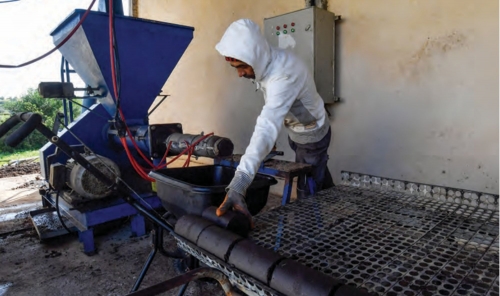Tunisian startup turns olive waste into clean energy
AFP | Sanhaja, Tunisia
Email : editor@newsofbahrain.com
For generations, rural households in Tunisia have burned olive waste for cooking and heating, or used it as animal feed.
In a northern Tunisian olive grove, Yassine Khelifi's small workshop hums as a large machine turns olive waste into a valuable energy source in a country heavily reliant on imported fuel.
Holding a handful of compacted olive residue — a thick paste left over from oil extraction — Khelifi says, "This is what we need today. How can we turn something worthless into wealth?"
An employee operates a machine that turns olive pomace into heating briquettes at the grounds of the startup Bioheat, on March 3, 2025, in Sanhaja near Tunis.
The soul of olives
Selim Sahli, 40, who runs a guesthouse, said he replaced traditional firewood with Khelifi's briquettes for heating and cooking. "It's an eco-friendly and cost-effective alternative," he said. "It's clean, easy to use, and has reduced my heating costs by a third."
Mohamed Harrar, the owner of a pizza shop on the outskirts of Tunis, praised the briquettes for reducing smoke emissions, which he said previously irritated his neighbors. "Besides, this waste carries the soul of Tunisian olives and gives the pizza a special flavor," he added.
For generations, rural households in Tunisia have burned olive waste for cooking and heating or used it as animal feed.
The International Olive Council estimated Tunisia will be the world's third-largest olive oil producer in 2024-2025, with an expected yield of 340,000 tonnes. The waste generated by the oil extraction is staggering.
Khelifi, an engineer who grew up in a family of farmers, founded Bioheat in 2022 to tackle the issue. He recalled watching workers in olive mills use the olive residue as fuel. "I always wondered how this material could burn for so long without going out," he said. "That's when I asked myself: 'Why not turn it into energy?'"
Beyond profit, Khelifi hopes his startup helps "reduce the use of firewood as the country faces deforestation and climate change."
At his workshop, employees transport truckloads of olive waste, stacking it high before feeding it into the processing machines. The material is then compacted into cylindrical briquettes and left to dry for a month under the sun and in greenhouses before its packaging and sale.
Khelifi began developing his idea in 2018 after he traveled across Europe searching for a machine to turn the olive paste into long-burning fuel. Unable to find the right technology, he returned to Tunisia and spent four years experimenting with various motors and mechanical parts. By 2021, he had developed a machine that produced briquettes with just eight-percent moisture. He said this amount significantly reduces carbon emissions compared to firewood, which requires months of drying and often retains more than double the amount of moisture.
Bioheat found a market among Tunisian restaurants, guesthouses, and schools in underdeveloped regions, where winter temperatures at times drop below freezing. But the majority of its production — about 60 percent — is set for exports to France and Canada, Khelifi said.
The company now employs 10 people and is targeting production of 600 tonnes of briquettes in 2025, he added.
Did you know? Olive trees can live for thousands of years! Some olive trees in the Mediterranean region are over 2,000 years old and are still producing olives today. Their resilience and longevity make them a symbol of peace and endurance.
Related Posts

